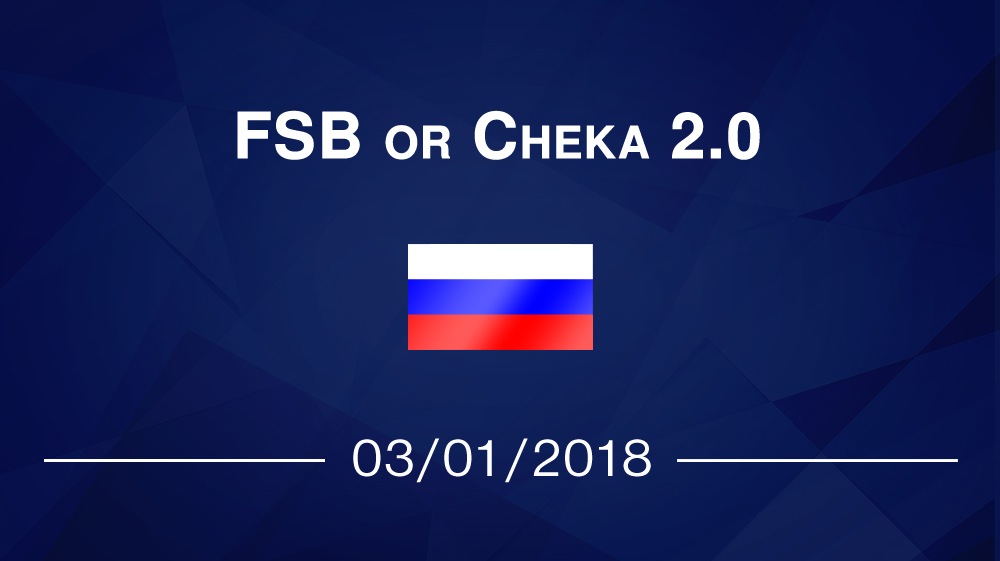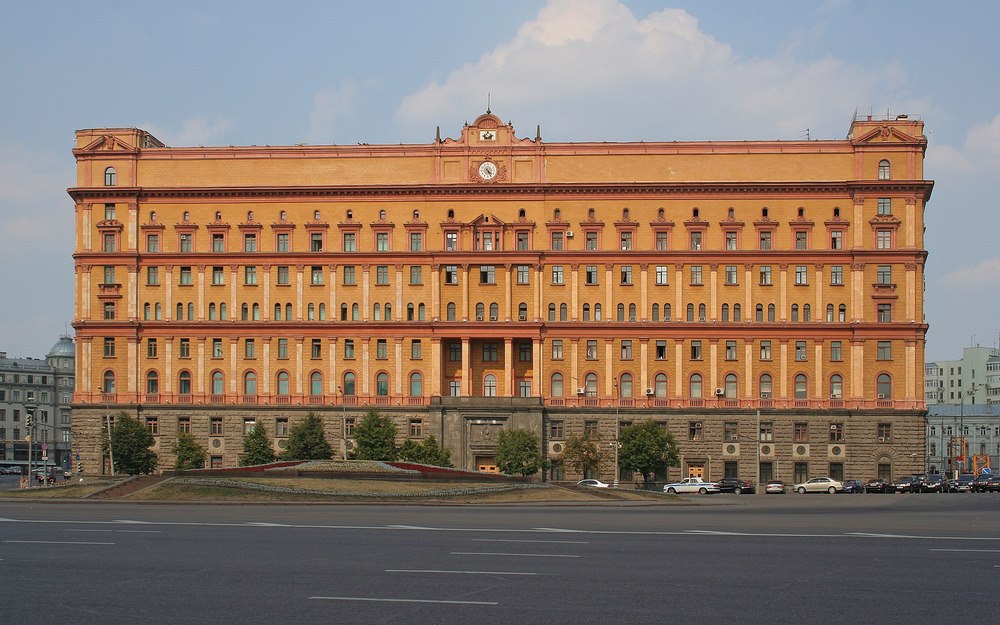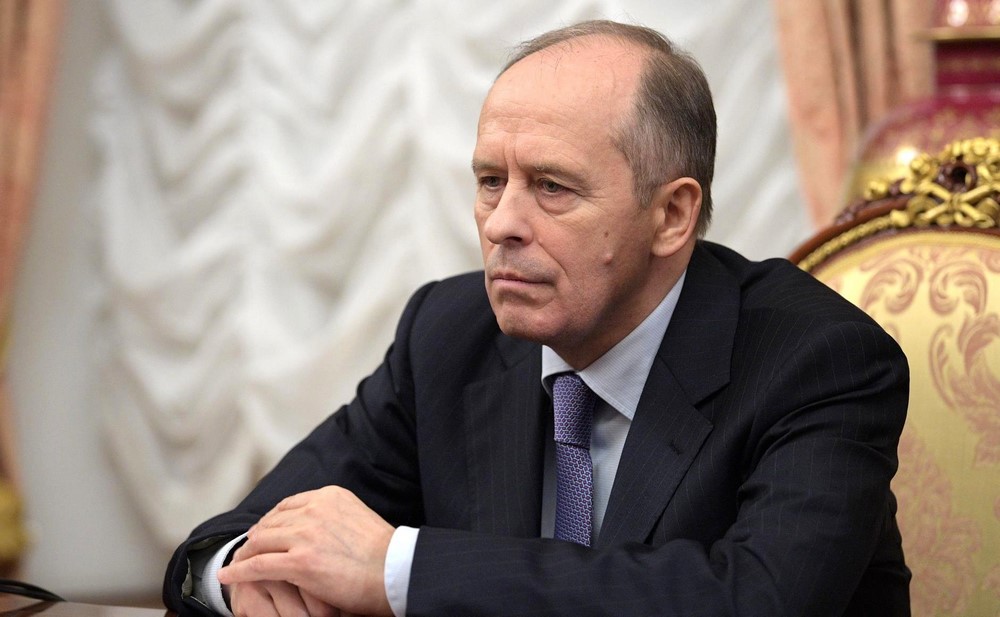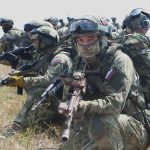SPECIAL REPORTS
Date: 3 January 2018
FSB or Cheka 2.0
The Federal Security Service remains the most important part of the repressive apparatus of the Vladimir Putin regime and the main successor of the Chekist tradition. However, it has recently had to face the National Guard, its most dangerous rival. Competition with this relatively new security institution as well as the internal changes in Lubyanka Square will determine the near future of the FSB. The priority of its management is to preserve the dominant position in Russia’s security system so it can be expected, especially during the presidential campaign, that various steps will be undertaken in order to achieve this goal.

- The Federal Security Service (FSB) openly refers to the Bolshevik traditions and Soviet security organs, presenting the activities of the Cheka, the NKVD and the KGB in a positive light. Such a rhetorics aims at building the image of the FSB as a “shield and sword” of the modern Russian state.
- In the near future, one may expect some increased “spy-mania” activities, fuelled by the FSB structures. Particular interests of the service coincide with the political course of the Russian state, confrontational towards the West and repressive against the real and imagined internal opposition.
- The main external rival of the FSB is the National Guard, whose ambition is to become a kind of Putin’s safety formation. It is headed by Viktor Zolotov while the president seems to trust the new service more than the FSB when it comes to its potential to fight against internal enemies.
- In addition, some important changes have occurred in Lubyanka Square. Igor Sechin is losing his important influence he used to have as it is evidenced by the end of Oleg Feoktistov’s career, along with the decomposition of the so-called Sechin’s spetsnaz, an informal network of FSB employees (6th Interior Security Department) and other state structures.
- The case against Shakro Molodoy (Shakro the Young) is still developing as it was evidenced by the detainment of a high-ranking official of the Investigative Committee Alexey Kramarenko in December this year. This is Feoktistov’s another trusted man who is in serious trouble today. The FSB may also use this case to weaken, and possibly even liquidate, the Investigative Committee.
- Also Sergei Korolev, who has been head of the FSB’s economic security department since 2016, seems to strengthen his position within the FSB structures. He eliminates the remnants of Feoktistov’s influence and fills vacancies in other cells of the FSB with “his” people; one of his trusted men is now head of the Internal Security Directorate. Korolev has also formed an alliance with the chief of the Federal Guard Service (FSO) Dmitry Kochnev.
- Also Sergey Alpatov, the head of the FSB’s Department M (in charge of the affairs of employees of law and order services), seems to extend his zone of influence. In Lubyanka Square, his group is referred as “Alpatov’s people”. They managed to work out the officers of the Investigative Committee connected with Feoktistov and the case of Shakro Molodoy.
In December 2017, Russia celebrated the centenary of the founding of All-Russia Special Commission for Counter-Revolutions and Sabotage (Cheka). On this occasion, at a meeting with security officials, President Vladimir Putin gave a speech in which he called contemporary Chekists “real patriots and defenders of the state who put a security barrier against foreign interference in our social and political life.” On the occasion of the centenary of the founding of Lenin’s secret police, the director of Russia’s FSB security service, its most direct heir, Alexander Bortnikov gave an interview, in which he emphasised the uniqueness of the service, both in the past and in the modern era. The Cheka’s founding anniversary along with self-promotional activities of the FSB (not only Bortnikov’s interview) has coincided with the beginning of Putin’s campaign. It should be expected that Lubyanka would create the impression that it is an essential and the most important foundation of the regime. Its aim is to secure the FSB from possible negative changes in the regime’s security system, which usually occurs at the beginning of Putin’s new presidential campaign.
FSB in the security apparatus
Over last two years, the FSB has conducted a number of high-profile anticorruption investigations. As a result, the service has become an important player in regional policy, which had forced many governors and high officials working “in the field” to submit their resignation. Interestingly, the investigations conducted against the employees of other force structures, above all the Ministry of the Interior and the Investigative Committee of Russia (SKR) had even more serious consequences. The FSB has weakened or even eliminated its competition in the form of anti-corruption structures in these institutions. The service’s position has also been strengthened by top-down reforms within the framework of the security apparatus. Putin has disbanded Lubyanka’s old competitor, the Federal Service for Drug Control (FSKN), as well as the Federal Migration Service (FMS). What seems to be characteristic for the FSB, the service has taken over the personnel of the attacked structures. The people who had worked in Lubyanka Square or those who had been loyal to the service have filled vacancies in other institutions. The Federal Customs Service of Russia (FTS) may consider such an example. Still in 2016, the FSB used the allegations of corruption, which led to the resignation of the head of the FTS Andrey Belyaninov. His successor, Vladimir Bulavin, was a former KGB officer, former deputy director of the FSB (2006), then he became Patrushev’s deputy in the Security Council, before he was sent to the FTS.
The FSB’s activities are determined by the federal law. The FSB grants security in the broadest sense of the term. It has all the powers typical for any anti-terrorist institutions. The service fights against cybercrime or extremism, which, according to Russian law, means the possibility of repression of all criticism of state apparatus. Of course, the FSB is also a counterintelligence service whose scope of activities covers all areas of life in Russia, from the army to the banking sector. The FSB is authorised to conduct both operational and reconnaissance activities. The scope of its competence and the huge numerical and structural status of the service means that it can be called “the first among equals” amidst security institutions in Russia. There are at least seven influential force services, and the total number of officers and employees, who consider themselves as chekists, may amount to even 5 million.
The rivalry of the services is characteristic for Putin’s Russia; in the past, this competition even assumed the form of an open war, when not only the surveillance organs were spied on or stopped, but even there were some instances of assassination (the so-called “siloviki war” of autumn 2007 is the most known conflict of such a type). The traditional rival of the FSB was always military counterintelligence. The GRU, although weakened under Putin’s regime, has recently strengthened its position thanks to the wars in Ukraine and Syria. As a result, in the occupied part of the Donbass, there was a division of influence between the GRU and the FSB. In the autumn of 2017, there was a test of strength, which ended up with the victory of the FSB whose immediate manifest was he so-called coup in Luhansk (READ MORE IN THE REPORT– DONBASS COUP D’ÈTAT). After a part of the Donbass had been occupied by the Moscow-controlled “separatists”, Serhyi Kurchenko became the main intermediary in illegal trade transactions in the region. Before the 2014 revolution, the oligarch belonged to the so-called Yanukovych familia. He enjoys the protection of the FSB, and more specifically, he is a protégé of a influential FSB Colonel General Sergei Beseda. When the leader of the so-called Luhansk People’s Republic Igor Plotnitsky, a pupil of Vladislav Surkov (Putin’s advisor) and the GRU, started to collect up to 50% of value tax on goods exported from the Donbass by Kurchenko’s companies, the businessman complained to FSB protectors. As a result, Plotnitsky lost his position in Luhansk and the FSB made attempts to change leadership in Donetsk.
However, the real Lubyanka’s enemy in the fight for power priority of the Russian regime is the National Guard (Rosgvardiya), established in 2016 by a decree signed by President Vladimir Putin. Since then, the military service has been constantly striving to expand its competences such as intelligence and analytical tools. The FSB and its political lobbyists are currently doing their best to block the expansion of Rosgvardiya. The latter, by gaining the aforementioned powers, would not only duplicate the FSB’s competences, but, additionally, it has enormous military power incomparable to the one wielded by the FSB. When Putin created Rosgvardiya and chosen the former head of the Presidential Security Service Viktor Zolotov its director, onApril 6, 2016, the president signed a decree whereby Zolotov was appointed permanent member of the Security Council of Russia. But on April 11, 2016, the decree was slightly changed and Zolotov was “relegated” to the position of an ordinary member of the Council. The FSB’s influence in the Council proved to be strong enough also in August, a few months later, when some changes occurred: Sergey Ivanov was replaced with Anton Vaino. The former remained in the Security Council whereas the latter became its member. However, Zolotov was not appointed permanent member of the Council. Thus, his status gives way to the one of the FSB director and the Defence Minister who, as permanent members, constitute a part of the so-called small Security Council.
It is expected that the rivalry between the FSB and Rosgvardiya will intensify and the Russian parliament may become the place of their oncoming battle. Since some time, in the State Duma, there have been some bills extending the powers of the latter. Right before the centenary of the founding of the Cheka, the State Duma was presented a draft bill that expanded the investigatory powers of the FSB and, at the same time, allowed the service to conduct cases against judges, prosecutors, investigators and lawyers.

Lubyanka’s self-promotion
In such a situation, one of the most commonly used methods of strengthening the position is praising successes and showing how it is necessary for the authorities. In the case of the FSB, there are three areas where such self-promotion activities can be conducted: counter-revolutionary activity, counterintelligence activity and anti-terrorist activity.
An example of “counter-revolutionary” activity can be observed upon the so-called the November 5th Revolution. It shows how the FSB copes with the lack of the opposition that might consider a real threat to the regime and that would possibly use some illegal methods; the service tries to invent such in order to liquidate it. In this case, it was an extensive provocation aimed at finding the most radical and violent opponents of the government. The security forces had stormed on November 3; as informed, they had detained in Moscow several members of the Artpodgotovka (Artillery Bombardment) nationalist “conspiracy cell”. They were told to be in possession of weapons and Molotov cocktails. According to the FSB, the group’s aim was to provoke mass riots by attacking administrative buildings and the police. On November 4, detentions were continued but the real “apogee” took place the next day, on November 5. That day, Artpodogotovka’s supporters gathered in Moscow in order to take part in an anti-government demonstration. More than 300 people were detained in the capital and 150 other demonstrators were arrested in other cities of Russia. They all have something in common as they gathered on the streets at the request of Vyacheslav Maltsev who considered himself as a nationalist and anarchist; moreover, he has called for a “people’s revolution” against Putin’s regime. It seems that he is either a deliberate FSB provocateur or he has only become its tool. In 2013, a former militiaman founded Artpodgotovka videoblog, thanks to which he has rapidly gained popularity. He had already announced the revolution and even set an exact date: November 5, 2017. Since that time, he has been repeating that date in each episode of his videoblog. For four years. Perhaps it was only a provocation prepared from the very beginning by the FSB; however, it is more likely that the secret services had decided to use Maltsev’s extreme radicalism and popularity for their own purposes. This is indicated by the sequence of events. Until June, Maltsev has freely shared his viewpoints in the Internet; it needs to be added that many others would be imprisoned for offence under article on extremism. The investigation was launched in June whereas Maltsev fled to France without any difficulties only a month later. While applying for asylum, he continued to call for a revolution through his videoblog. On October 10, he was arrested by default by a court. On October 26, Artpodgotovka movement was banned. However, the FSB blocked its video blog only on October 31. In addition, the authorities, which are usually quite effective in the censorship of the Internet, did not prevent anyone from sending thousands of e-mails from Maltsev’s mailbox to Artpodgotovka’s supporters to call them for preparing arms and Molotov cocktails, and to arrive in Moscow on November 5 to overthrow the regime. They rushed to the capital and fell into a trap, as the FSB had been ready. Some of the “revolutionaries” were stopped at the train stations after they barely got out of the train whereas others were seized on the street. In this way hundreds of rebels, mostly radical teenagers, could be detected. It may happen that the FSB will scare and recruit some of them whereas a few of them will be imprisoned just to impress the public opinion. In addition, the service can boast of its own success, that is, the liquidation of the “anti-state conspiracy.”
The fight against the “revolution” is important for the FSB because this is the area of activity where it strongly competes with Rosgvardiya. After all, Putin established the guard in order to suppress possible social revolt. But, apart from them, the FSB fights against the spies and, according to Lubyanka’s statements, the service has already weeded out tens or hundreds of them. Another serious problem is Islamic terrorism. From the very beginning, the fight against it has constituted the core of Putin’s power. Even today, it is still a convenient tool to expand authoritarianism. For the FSB, it seems to be a reason to show its key role. In December this year, Bortnikov traditionally boasted that his services had broken a terrorist cell that had planned to carry out attacks in Russia during the holiday season and during the presidential campaign in 2018. According to him, a terrorist group, which was to be led by the leaders of the so-called Islamic State, was broken on December 9-11. Bortnikov has also drawn attention to the threat posed by jihadists from the former USSR, who had fought in Syria, and were now able to return home. According to the head of the FSB, since the beginning of 2017, more than 1,000 fighters have been detained in Russia whereas 78 terrorists have been killed. He added that in 2017, the services managed to prevent 18 attacks and break 56 terrorist cells.
The rise and fall of General Fix
The severe conviction (8 years of prison and a fine of 2.2 million dollars) for former economy minister Alexey Ulyukayev symbolically closed the era of domination of a group of officers working for Igor Sechin in Lubyanka Square. Although the prosecution evidence had been dramatically weak, and the entire provocation against the minister had been badly prepared and carried out, the verdict was issued. Such a state of affairs seems to confirm the strong position of Sechin, who did not show up during the hearings; after all, the entire accusation was based on his claims. The main representative of Sechin’s interests in Lubyanka, General Oleg Feoktistov, has become a scapegoat.
Feoktistov served as a border guard in the Republic of Karelia. It was where he made friends with the officer of the KGB military counter-intelligence Sergei Shishin. The latter became the head of the ISD. Shishin had connections in the Kremlin, and he presented reports directly to the deputy head of the presidential administration Igor Sechin (and not to the Nikolai Patrushev, the FSB director at that time) who was then in charge of the power structures. At the beginning of 2003, Sechin instructed Shishin to build a FSB unit that would be granted maximum wide powers. It was Feoktistov himself who was in charge of the recruitment of personnel of the 6th Service of the FSB’s ISD. The core of the unit were the veterans of Alpha and Vympel, as well as some officers from Sochi where Shishin once headed the city’s FSB department. General Colonel Shishin left the FSB in 2007 after a series of scandals with supplies of Chinese contraband to FSB warehouses near Moscow. He was appointed vice-president of VTB Bank. He is also a member of supervisory bodies of one of the banks subordinate to Rosneft and RusHydro Group.
However, Feoktistov became an informal leader of “Sechin’s spetsnaz” in Lubyanka Square. One of the first serious cases of the 6th Interior Security Department was the liquidation of the FSKN anti-drug agency in 2007. As a result, the head of the service and former deputy head of the FSB Viktor Cherkesov lost his position. The 6th Interior Security Department was also responsible for all high-profile cases of the last decade (until mid-2016): the governor of the Sakhalin Oblast, Aleksander Khoroshavin, the leader of the Komi Republic, Vyacheslav Gaizer, and the governor of the Kirov Oblast, Nikita Belykh. The head of this board, General Denis Sugrobov, was caught when it turned out that his agents, under the guise of businessmen, had been offering bribes to officials. The last provocation of Sugrobov’s people was an attempt to catch the deputy head of the 6th Service of the FSB’s ISD Igor Demin red-handed while he had been accepting a bribe. General’s people were imprisoned whereas he was sentenced to 22 years in a penal colony.
Because of his powerful influence, known as the Great Oleg or General Fix, Feoktistov has made many enemies in various institutions, including the FSB, over the years. Eventually, he was “eliminated” by his FSB colleagues. Possibly, it was Bortnikov himself who had felt threatened so he had provided Putin with a list of charges against Feoktistov. And he probably got the “green light” to stop Feoktistov’s growing influence. He was hit by an operation against high-ranking officers of the Investigative Committee. It was about the so-called the case of Shakro Molodoy; an investigation of corruption and cooperation between law enforcement officials and the famous gangster Zakhary Kalashov. Once the FSB investigation had been revealed, former head of the Investigative Committee’s Moscow Department senior official Alexey Kramarenko, his deputy Alexander Khurtsilava and priority cases investigator Andrey Bychkov submitted their resignation. On July 13, 2016, the court issued a sanction for the arrest of Shakro Molodoy. In this case, on the night of July 18 to July 19, Deputy Head of the Main Investigation Directorate of the Investigative Committee in Moscow General Denis Nikandrov and two other high-ranking officers were taken into custody. Some of the general’s people were taken into custody, including the head of the Investigative Committee Bureau of Internal Affairs Mikhail Maksimenko He is not only the right hand of the head of SKR Alexander Bastrykin, but also Feoktistov’s personal trust, similarly as Nikandrov. He was the one who conducted the investigations on the basis of operational materials provided by the 6th Interior Security Department. On December 27, 2017, Kramarenko, now a Rosneft employee, was arrested. Further detentions should be expected, and the scale of purges in the Committee may lead to its reform or even liquidation. It is possible that he will return to the prosecutor’s office and many investigatory powers will be taken over by the FSB. It also seems that Feoktistov should be afraid since detainees can say a lot about him and his activity.
The end of the “Sechin’s spetsnaz”
In the summer of 2016, Feoktistov received the second blow. Once he had “eliminated” the current leadership of the FSB Economic Security Service, when the new chief of the ESS became the current head of the FSB’s ISD and the formal Feoktistov’s superior Sergei Korolev, it seemed that his deputy would be promoted to his position. Feoktistov became an acting chief of the service and it was even speculated that he would get promoted. It was assumed that he would be replaced by the head of the FSB in the Kaliningrad region, Yevgeny Zinichev. But he was unexpectedly appointed acting governor of Kaliningrad. However, Feoktistov, instead of formalising the position of the chief of the Internal Security Directorate, was dismissed by Putin himself. He was replaced by Korolev’s trusted man, the current Head of the 2nd Division of the Internal Security Department (ISD) of the FSB Alexey Komkov.
Some people claim that he had to leave because he made Putin angry when the 6th Interior Security Department had targeted Russia’s Federal Customs Service chief Andrey Belyaninov. Putin’s old friend managed to avoid the allegations but he lost his position (since December 1, 2017, he has been the Chairman of Management Board of the Eurasian Development Bank). According to another version, it was Bortnikov who had got rid of Feoktistov as he had considered him as a threat in Lubyanka.
Feoktistov, responsible for Rosneft’s security service, coordinated his last operation. Formally, it was conducted by the officers of Department K of the FSB (counterintelligence in the banking and finance sector) headed by Feoktistov’s former subordinate, namely the chief of the 6th Service Ivan Tkachev. It seems that the officers, colloquially referred as “kashniki”, were manually controlled by Feoktistov from Rosneft’s headquaters. It should be remembered that the general worked in the corporation as a delegated FSB employee. It is the APS mechanism also referred as the apparatus of delegated employees (the so-called active reserve). A FSB officer relegated to the APS is granted the same rights as an employee who remains in active service. He is authorized to conduct operational and investigative activities. The economy minister Alexey Ulyukayev was detained in November 2016, when he came to meet Igor Sechin from whom, according to the investigators, he had taken a $ 2 million bribe. In this way, he was requested not to interrupt Rosneft as the oil company had tried to participate in the privatization of Bashneft. It was Feoktistov who had prepared his boss for the provocation. It did not work out as they had wanted, though. During his conversation with Sechin, Ulyukayev did not explicitly confirm (the conversation was recorded) that he took two million dollars as a bribe; the cash was taken from VTB Bank and it is probably not a coincidence that its Vice President is Shishin, Feoktistov’s friend and Sechin’s trusted man. And that was to be the key evidence. This semi-successful provocation was one of the reasons why Feoktistov had to leave Rosneft in March 2017. Sechin announced that his subordinate had “got back to his responsibilities” It was said that he could become the head of the FSB’s Department P (counterintelligence security of industrial enterprises) and even the deputy head of the ESS at the same time. However, he never did. Since that time, Feoktistov has been unemployed. It was in the autumn of 2017 that he received a position of the adviser for staff of head of the bank, which eventually went bankrupt, and it is currently undergoing recovery procedures under the control of the Russian Regional Development Bank, which belongs to Rosneft.
In the summer of 2016, when Feoktistov left Lubyanka, many of his trusted people lost their jobs in the security services. Others went to the Department K, headed by Ivan Tkachev. But his position is also becoming weaker. In order to occupy this position, he should have a general rank whereas he is still only a colonel. As a general, he is likely to be out of office work and thus there will a vacancy in the Department K, which means the liquidation of Feoktistov’s last influences in Lubyanka. Immediately after his depature in summer this year, the 6th Interior Security Department has been marginalized. Since then, all new cases of detentions have been made on the basis of materials provided by other FSB cells. Currently, the leader in this respect is the Department Z, responsible for constitution protection, which is in fact the heir of the Fifth Department of the KGB of the USSR In addition, the famous case of Kirill Serebrennikov is operationally supervised by the 2nd Division of the Internal Security Department. They have also dealt with the operational investigation of the case of the FSB’s deputy head of cyber investigations accused of state treason.

New People in Lubyanka
It is Sergei Korolev, head of the FSB’s economic security department, who is a new éminence grise within the FSB structures. He is a representative of the new wave of “young technocrats”, who are increasingly entering important positions in the state apparatus. Korolev joined the service at the beginning of the previous decade. Until 2004, he worked in the Economic Security Service in Saint Petersburg, then he was briefly transferred to the reserve of the Federal Customs Service and, a few years later, he became an adviser to the Minister of Defense of Russia Anatoliy Serdyukov. Importantly, Korolev was considered as a personal trust of former Prime Minister Viktor Zubkov, privately Serdyukov’s father-in-law. It is possible that in the defense department Korolev was in charge of monitoring the work of the GRU on the authority of the FSB (it needs to be remembered that the service leads counterintelligence activity to protect the army). In 2011, the head of Internal Security Directorate Alexander Kupryazhkin was promoted to the deputy director of the FSB. Although it seemed that his place would be taken by Feoktistov, eventually it was Korolev who had been chosen. For the second time, a similar situation took place in the summer of 2016 after many high-ranking officers of the Economic Security Service handed in their resignation. In connection with the so-called Mikhalchenko’s case, the FSB’s ISD carried out search in houses of their colleagues from the ECC who were involved in the scandal. As a result, the Head of the FSB Economic Security Service Yuri Yakovlev and his subordinate, the chief of the FSB’s Department K (providing counterintelligence security to the financial and credit organisations) Viktor Voronin, resigned from their posts in June and July 2016. The former chief of the ISD Sergei Korolev became the new head of the Economic Security Service. The Department K was given to Ivan Tkachev, the former head of 6th Interior Security Department. However, Feoktistov had to quit Lubyanka. Korolev is said to be associated with the brothers Arkady and Boris Rotenberg, Putin’s trusted oligarchs. Moreover, he is also said to be highly appreciated by the FSB director Alexander Bortnikov. At present, Korolev controls the FSB’s Economic Security Service and the FSB’s Internal Security Board; in Russia, both departments seem to be crucial from the business and financial points of view. He suggested that the next head of the ISD should be the hitherto chief of the 2nd Division of the Internal Security Department Alexey Komkov. The FSB’s Economic Security Service protects all areas related to the economy. It monitors the activities of banks, industrial and transport companies, as well as it combats money transfer abroad, money laundering and smuggling. However, the Internal Security Directorate (ISD) is a type of security service: it deals with violations of law by FSB employees and protects Lubyanka due to its counterintelligence activities.
Korolev builds his zone of influence also outside Lubyanka Square. He remains in a close cooperation with the FSO. In November 2016, the FSB detained former Head of the Federal Protective Service (FSO) in the North-Caucasian Federal District Gennady Lopyrev on the charge of bribery. He is a trusted man of the previous head of this service, General Evgeny Murov. The new head of FSO Dmitry Kochnev addressed the FSB to get rid of him. The FSB offensive also hit the Ministry of the Interior. The detention of Colonel Dmitry Zakharchenko (search in his house revealed 8.5 billion rubles in foreign currencies) led to the liquidation of the Department T (fuel and chemical sectors) of the General Administration for Economic Security and Combatting the Corruption (GUEBiPK) where he had worked before.
Although formally, Alexander Bortnikov is still the director of the FSB, it is Korolev who wields huge power. He was allegedly responsible for launching an investigation against Colonel Sergei Mikhailov, Deputy Chief of the FSB Information Security Center (ISC), and his purported associates also considered as traitors. As a result, the head of the structure has changed. In July 2017, Andrei Gerasimov was replaced by his former deputy Sergey Skorokhodov. Interestingly enough, the current head of the FSB has been appointed director by the head of the Economic Security Service, the position currently occupied by Korolev. Some people consider him as Bortnikov’s successor.
All texts published by the Warsaw Institute Foundation may be disseminated on the condition that their origin is credited. Images may not be used without permission.














